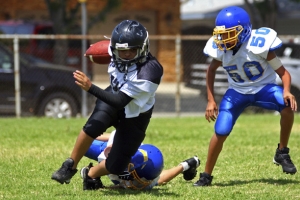
Michelle is in third grade but is behind in her reading and writing. Her mom, Deborah, says, “Michelle will not pick up a book to read just for fun. She is struggling in every academic subject.”
Peaches says of her son, “One day while in the doctor’s office he wrote the entire alphabet on the board and most of the letters were backwards. He had trouble writing from the left side of the paper and reading small print.”
What’s Wrong?
Your child can’t seem to grasp phonics. He writes sloppily and totally backwards, sometimes even whole sentences. He has a short attention span and seems to have Attention Deficit Disorder. He can’t seem to sit still and needs to use his hands to learn.
Does this sound familiar? If it does your child may be dyslexic. According to the Dyslexia Institute, between 4 -5 percent of the population struggle with some form of dyslexia.
Dyslexia in children often goes undiagnosed. It can be seen as a behavior problem, or the child may be labeled as slow when in fact he is very intelligent. So how do you know if your child is dyslexic? The Dyslexia Institute offers this list of signs to watch for if you think your child might be dyslexic, including some common problems and some strengths dyslexic children often have. Remember not every child will have all of the traits and the symptoms will vary in the degree it affects each child.
All Ages
Is he bright in some ways with a ‘block’ in others?
Is there anyone else in the family with similar difficulties?
Does he have difficulty carrying out three instructions in sequence?
Was he late learning to talk, or speaking clearly?
Ages 7-11
Does he have difficulty with reading or spelling?
Does he put figures or letters the wrong way e.g. 15 for 51, 6 for 9, b for d, was for saw?
Does he read a word then fail to recognize it further down the page?
Does he spell a word several different ways without recognizing the correct version?
Does he have a poor concentration span for reading and writing?
Does he have difficulty understanding time and tense?
Does he confuse left and right?
Does he answer questions orally but have difficulty writing the answer?
Is he unusually clumsy?
Does he have trouble with sounds in words, e.g. poor sense of rhyme?
Ages 12 - Adult
Is he sometimes inaccurate in reading?
Is his spelling poor?
Does he have difficulty taking notes or copying?
Does he have difficulty with planning and writing essays, letters or reports?
Common Problems
You may think:
He’s not listening but …
• he may have difficulty in remembering a list of instructions.
• he may have problems getting his thoughts together coherently for story or essay writing.
• he may have sequencing problems and may need to be taught strategies to cope/alternative ways of remembering.
He’s lazy but …
• he may have difficulty in organizing his work and need specific teaching to help him.
• he may be able to answer the questions orally but he can’t write them down.
• the child may have found that the less he writes, the less trouble he gets into for making mistakes.
He’s not concentrating but …
he may have difficulty in copying accurately. This is often because he cannot remember chunks but needs to look at each letter, write it, then look at the board again, find the place, and so on.
He’s careless but…
• he may have very poor handwriting as he hasn’t sufficient hand skills to control the pencil
• he may spell the same word several different ways if he doesn’t have the visual memory to know what is right or the kinesthetic memory for it to feel right as he is writing.
He doesn’t look carefully but…
he may have a visual memory deficiency and therefore experience difficulty when interpreting symbols.
He’s being awkward / impossible on purpose but…
he may be able to produce very good work one day and the next trip up over every word. “Off days” are quite common and require extra encouragement and understanding.
Dyslexic children also have some strong points that you may recognize:
He has a good visual eye; he may be able to arrange the furniture in the classroom very effectively.
He’s very imaginative and skillful with his hands: he may be able to make the best models.
He’s practical: he may be able to work the computer before the others—even perhaps repair it.
He’s mad about sports: he may excel at individual sports.
He’s got a fantastic imagination: he may be able to tell wonderful stories if his long-term memory is good.
If your child has any of the symptoms listed above, don’t wait to get your child the help he needs. Talk to your pediatrician about what testing options are available. Have his eyes examined to rule out the need for glasses.
Read all you can on the subject. An excellent book that changed Denice’s son’s life was The Gift of Dyslexia by Ronald D. Davis. The Writing Road to Reading: The Spalding Method of Phonics for Teaching Speech, Writing and Reading by Romalda Bishop Spalding and Walter T. Spalding, is especially good if you are homeschooling your child and teaching him to read. It is for all ages, not just younger children. Using techniques in that book gave fourth-grader Mark a love for reading he never had before.
Most of all, realize that although your child may have problems learning, he also has his own special talents and gifts. Be patient with him and help him realize that he can overcome his problems.
Belinda J. Mooney is a freelance writer.
_________
For more information, visit San Diego Branch of the International Dyslexia Association
www.dyslexiasd.org
Dyslexia, the Gift
www.dyslexia.com
Children with Special Needs
www.children-special-needs.org/parenting/dyslexia_dyslexic.html



















